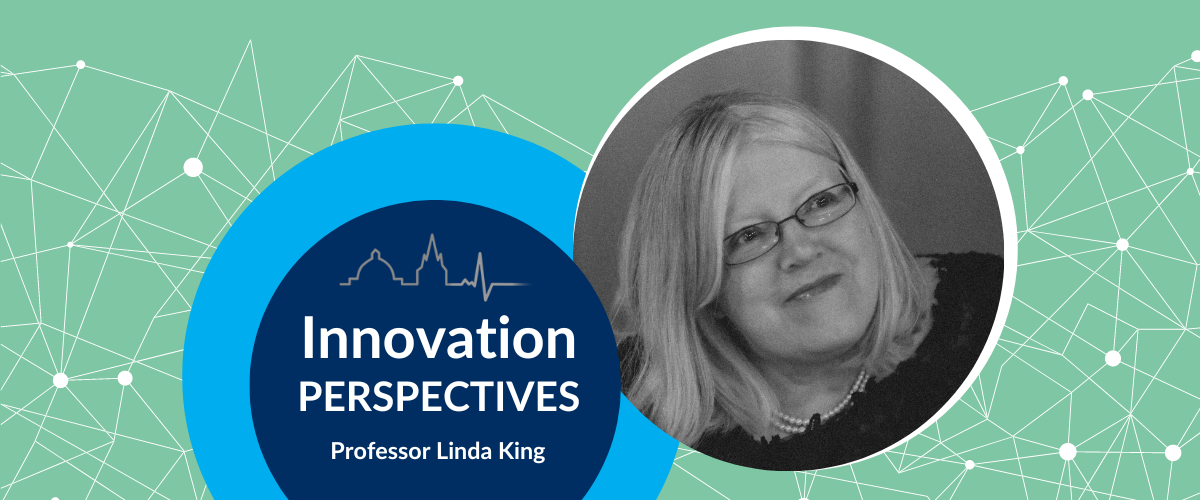Professor Linda King, OAHP Board Member and Pro-Vice Chancellor for Research and Global Partnerships, Oxford Brookes University
Professor Linda King, Pro-VC for Research and Global Partnerships at Oxford Brookes University discusses the University’s research and innovation networks, how enterprise enriches the student experience, and career pathways for women in enterprise.
Innovation Perspectives is OAHP’s Q&A series with OAHP Board Members and partner organisation leads.
“We’ve tried to open up opportunities right through the whole career pathway and tried to reduce some of the barriers for women. In the longer term, as we increase the number of spinouts as startups, overall women will be well represented in those.”
Oxford Brookes University recently joined the Oxford Joint Research Office to facilitate the delivery of joined-up clinical research across the region. What do you think are the remaining unmet needs for streamlining collaboration across Oxford’s academic and NHS partners?
Improving dissemination and communication across our research communities, which is always challenging in such a complex research landscape. Within Oxford Brookes we have developed seven cross-university research and innovation networks, using a bottom-up, researcher-led approach. These bring together researchers, innovators and those that support these activities across disciplines in areas such as Healthy & Ageing & Care and Children & Young People.
We are now starting to use these networks to engage and communicate with collaborators across the Oxford ecosystem. We hope this will help promote collaboration in future, because in the end, we need to co-create solutions to problems. While only some of the networks are focused on health, I do think that many of the disciplines we have at Brookes, like the built environment and architecture, can play a really important role in healthy lives. This is something unique that Brookes can bring to the party, as well as health research.
How will these research and innovation networks operate?
Each of the networks are funded and resourced to have their own distinctive programme of events, they’ll each have either a seminar series, workshops, or podcasts. They’ll also each have at least one big event each year which is open to everyone to join.
We’re really trying to encourage external people to engage, either online or face-to-face, because that’s really important too. We also plan to utilise the networks to facilitate larger grant applications, for example, where we often need partners to come on board. So hopefully these networks will help us to engage and build those relationships in advance.
Oxford has a thriving ecosystem for innovation, how does this benefit the student experience at Brookes?
We have just launched our new Enterprise Centre, which is here to facilitate our own start-ups and spin-outs, but also those from the community as well. We have companies here whose researchers originally came from Oxford, Cambridge and other universities.
What’s key for us is that our students benefit from having this hub on campus, so all the companies in the BioInnovation Hub and Enterprise Centre are really strongly encouraged to provide internships and placements for students. Most of the companies have grown through employing Brookes’ students – we’ve seen lots of students doing placements, internships and then being offered jobs, which is really good.
We also have our own student-based start-up space, where we have ICEQube (a pre-incubation space for technology), BEHive, and Thrive, which is our enterprise programme. By being very student-facing, our hope is that through these initiatives our student’s business ideas can grow and then move on to the Enterprise Centre when they’ve actually become a start-up.
Alongside this, we have a programme to embed enterprise skills, so we’re using the Centre as a kind of living lab for students to be involved with and benefit from all the companies we have based there, including my own.
Recent research shows a significant gender imbalance in UK university spinouts, with only around 20% having a woman founder in their C-Suite. You champion gender equality at Brookes, what do you think universities can do to tackle this trend?
At Brookes, our own EPSRC-funded research on inclusion and gender equality in spinouts has unearthed a whole suite of things that universities can put into practice to address this gender imbalance, and we have learnt a lot from this project.
Alongside Brookes’ quite extensive suite of enterprise programs, we have a coaching programme called Bloom, which is dedicated to supporting women entrepreneurs and it has proved really positive.
I’m also pleased to say that all three of our life sciences spinouts at Brookes have a woman co-founder, and we have used these as role models, alongside women investors, at events, to showcase women at Board level and as founders.
As part of our Athena SWAN action plan for the next five years, we have a theme dedicated to encouraging women as entrepreneurs and into enterprises. We’re also working to embed alternative career pathways from undergraduate level through to PhD level and then into early-career research, and we have a career pathway for enterprise and knowledge exchange where you can be promoted up to professor on an enterprise/KE pathway.
Our efforts have never been positively biased, but we’ve tried to open up opportunities right through the whole career pathway and tried to reduce some of the barriers for women. In the longer term, as we increase the number of spinouts as startups, overall women will be well represented in those.
Based on your own experiences of spinning out a successful company, what advice do you have for Oxford’s budding innovators and start-ups?
Make sure your science base is really sound, have a passion for wanting your spin-out to help make a difference, and early on speak to the experts who can help you make it happen!
Funding is also really important, and I think for Brookes this has been a limit to the number of spinouts we can take through, and something we are looking to address through the support we offer in the Enterprise Centre.
When you have that support in place, my advice is to just then just go for it. Some will fail, for whatever reason, but I think it’s about learning from that experience, not being afraid of failing, but seeing the opportunity to go off in a different direction.
It’s hard to have a career plan that goes in one direction, sometimes you need to be prepared to take sideway steps to give yourself new opportunities.
At Brookes we provide staff with different opportunities to progress, you don’t always have to go through a research route, there are lots of other routes to progress in your career. I think this is one of the reasons why we have been able to enable much more gender parity in careers and I am proud that in 2022, just over 50% of our professors are women.

